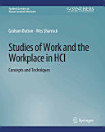Ethnomethodology, Conversation Analysis and Constructive Analysis: On Formal Structures of Practical Action
À propos de cet e-book
As the very "constructive analysis" that they opposed has begun to be incorporated into influential lines of research in ethnomethodology and conversation analysis, the authors return to the founding insights of the field and reiterate the importance of Garfinkel and Sacks’ original and controversial proposals for an "alternate" sociology of practical action and practical reasoning. Showing how constructive analysis has become entrenched in ethnomethodology and conversation analysis and arguing for a need to "re-boot" these approaches, this volume constitutes a call for a renewal of the radical alternative proposed by Garfinkel and Sacks.
À propos de l'auteur
Graham Button completed his PhD in sociology at the University of Manchester in 1975. He has published in the fields of both conversation analysis and ethnomethodological studies of work, and has developed collaborations with researchers in interactive computer systems design, extensively publishing in CSCW and HCI journals and books. His last appointment was Professor and Pro-Vice Chancellor for Arts, Computing, Engineering and Science at Sheffield Hallam University and before that he was the Laboratory Director of Xerox Research Centre Europe, first in Cambridge, and then in Grenoble. He has been a Principal lecturer in Sociology at the University of Plymouth; Visiting Faculty at the University of California, Los Angeles, and Boston University; Visiting Professor at the Universities of Nottingham and Plymouth; Visiting Scholar at the University of Cambridge and Visiting Senior Fellow at Tembusu College, the National University of Singapore. He currently enjoys being free of all institutional affiliations and obligations.
Michael Lynch is Emeritus Professor of Science & Technology Studies at Cornell University, and Research Professor in the School of Media and Information, University of Siegen, Germany. He received his PhD in Social Sciences at the University of California, Irvine, in 1979, and has held positions in Sociology, Human Sciences, and Science & Technology Studies at Whitman College, Boston University, Brunel University, and Cornell University. His major fields are ethnomethodology and social studies of science. He has investigated practical action, visual representation, and discursive interaction in scientific and legal settings, and also has written extensively about conceptual and analytical issues in the social sciences. He was Editor of Social Studies of Science from 2002 until 2012 and was President of the Society for Social Studies of Science in 2007–2009.
Wes Sharrock has been at the University of Manchester since 1965, first as a graduate student, and, since 1968, until retirement in 2018, as a member of the Sociology staff. He now has an Emeritus affiliation with the University. Troubled by Sociology’s apparent inability to take a serious interest in the world of daily life, he was influenced by Manchester’s social anthropologists and early drawn to the work of Ludwig Wittgenstein, Alfred Schutz, Harold Garfinkel, and Harvey Sacks, regarding them as – even now – largely under-appreciated. In company with collaborators of the same persuasion he has published on a diversity of sociological/philosophical topics in forms ranging from introductory guides to sociological theory and the philosophy of social research to journal papers on design projects, computer modelling in biology, print work, and mathematician’s work inter alia. He has long wanted to write a piece called It’s the language, stupid but hesitates to do so for fear it would cause offence.







